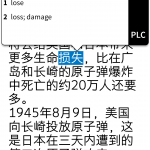Articles in the ‘Learning outside class’ category Page 14
-
Which words you should learn and where to find them
When learning a language, it’s important to know many words, but it’s also important that you learn the right words. How do you know which words to learn? Where should you find those words? And how much can you express using the ten hundred most common words?
Read → -
Chinese learning tools and resources worth paying for
This article introduced the few tools and resources I think you should consider paying for when learning Chinese. The first list contains things you really should pay for, the second of things I recommend paying for, but which aren’t strictly necessary. Do you agree? Which things do you think worth paying for?
Read → -
Why you should read Chinese on your phone
Reading Chinese in this digital age is a lot easier than it used to, but it’s actually even easier than many students think. The benefits of reading on your phone are important, including instant access to vocabulary, smaller chunks of text, portability and a sense of getting somewhere when you read. If you haven’t read a Chinese text on your phone yet, you really should give it a try.
Read → -
Chinese listening practice with 锵锵三人行
锵锵三人行 is one of the few Chinese TV programs I actually like. It’s also one of the best ones for language learners too, mostly because of it’s heavy focus on talking, availability of transcripts and variety of both guests and topics. This should be a key component of any immersion effort, but you probably need to be upper intermediate or above to benefit.
Read → -
Learning Chinese through audiobooks
Listening to audiobooks in a very good way to improve your listening ability beyond the basics. This article contains advice about how to choose a suitable novel, where to find it and how to listen to it.
Read → -
Bite-sized learning isn’t enough to learn Chinese
Bite-sized learning is great, but it’s not enough if you want to build real competence in Chinese listening and reading. To expose yourself to enough text and audio, you need long-form content that you can keep using even when you’re energy levels aren’t at 100%.
Read → -
Review: Mandarin Companion graded readers (Level 1)
Graded readers are an important step on your journey to becoming literate in Chinese. In this article, I review five books in the Mandarin Companion series, level 1, which uses only 300 unique characters. These books are useful for both beginners (extra reading) and intermediate learners (extensive reading).
Read → -
Will a Chinese-only rule improve your learning?
Is a Chinese-only rule good for learning? Most people agree that immersion is a good thing, but that’s not the same as saying that using no English is good
Read → -
The new paperless revolution in Chinese reading
In this (guest) article, David Moser writes about the importance of going digital in your Chinese reading practice. With the right tools and the right approach, learning to read Chinese becomes much easier. While it still requires time and dedication, it’s no longer as hard as it used to be. Don’t miss out on the paperless revolution in Chinese reading!
Read → -
Learning how to ask for and receive directions in Chinese
Asking for and receiving directions in Chinese might look very easy, it’s usually in the first part of a textbook series after all, but most students go through that chapter without actually learning the content. In this article, I discuss how to really learn this skill.
Read →









